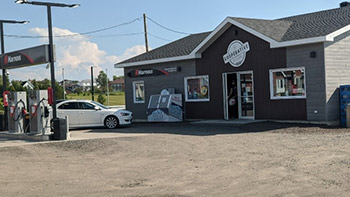Establishing a food co-op
What is a food co-op?
ICI COOP defines it as “a company […] owned by its members, who are all equal (1 member = 1 vote). The food co-op model allows communities to obtain products and services based on their needs, since members are both owners and customers of the business.”1
An intersectoral action
The levers for taking action on the food environment are held by various players in society (e.g., companies, ministries, municipalities, health, schools). That is why improving geographic access to healthy Nutritious foods through the establishment of a food co-op often requires intersectoral collaboration. In concrete terms, citizens and professionals from the municipal and public health sectors, social economy organizations, granting agencies, and others, are called upon to pool their expertise and resources.
Eleven key steps to opening a co-op

Projects often begin by the mobilization of citizens and local players in response to the needs of their community. Citizens sometimes get mobilized to collectively take over a business in financial difficulty in order to maintain services for the community. Indeed, the private model is not always viable for serving a small community due to the small number of potential customers. Once the choice of a co-op business model has been made, a provisional committee is formed. It includes the people responsible for running the co-op, from the pre-startup phase through to the general meeting when the first board of directors is elected.
A project feasibility study is carried out following the creation of the provisional committee. Then the committee mobilizes new stakeholders to support its project, develops its business plan, and proceeds to look for funding. The co-op’s incorporation involves various key steps, including the creation of its board of directors. The board will take over the operation and management of the company.
Milestones in the development of a co-op2
- Pre-startup phase
- Project idea and creation of the provisional committee
- Define the needs and rationale of the project
- Create provisional committee
- Complete feasibility study
- Design of the business model
- Mobilize stakeholders
- Develop business plan
- Search for funding
- Project idea and creation of the provisional committee
- Startup phase
- Incorporation
- Obtain legal status for the co-op
- Draft by-laws, policies, membership contracts, and registries
- Hold organizational general meeting and first board of directors meeting
- Getting to work
- Launch commercial activities
- Employee training, follow-ups, and annual general meeting
- Incorporation
Factors that facilitate the establishment of a food co-op
Certain situations are more conducive to intersectoral action. The EffICAS study has identified the following facilitating factors:
- Vigorous citizen mobilization;
- A vision shared by all project stakeholders;
- A visionary, unifying, convincing, credible, charismatic project leader with good leadership skills;
- A provisional committee or board of directors made up of willing and committed members with experience in project management, entrepreneurship, or finance;
- Support and collaboration from various stakeholders: municipalities, regional county municipalities, public health, the Coopérative de développement régional du Québec, the ICI COOP, local entrepreneurs, and other food co-ops;
- Financial support in the form of loans or grants from the municipality, regional county municipality, private companies, organizations involved in social economy, etc.
To learn more about the process of establishing a food co-op, as well as the facilitating factors and barriers, consult this article in the TOPO collection: The Process of Establishing a Food Cooperative: A Promising Intervention for Improving Physical Access to Food.
For more information
Social economy organizations in Quebec
- Coopérative de développement régional du Québec: for support from regional advisors across Quebec.
- ICI COOP: for support to federation members.
- Pôles régionaux d’économie sociale: for coaching, training, and networking.
- Réseau des Sociétés d’aide au développement des collectivités and Centre d’aide aux entreprises: for financing and support.
- Municipalities and RCMs sometimes offer economic development coaching and funding.
- Chantier de l’économie sociale: for information on the social economy.
- Conseil québécois de la coopération et de la mutualité (CQCM): for information on the social economy.
Related documents
- Chantier de l’économie sociale. (2019). Cadre de référence en économie sociale. https://chantier.qc.ca/decouvrez-leconomie-sociale/cadre-de-reference/
- Chantier de l’économie sociale. (2021). Guide d’introduction à l’économie sociale. https://chantier.qc.ca/wp-content/uploads/2019/05/CHES_Guide_introduction_2021_WEB.pdf
- Desmarais, C. (2022a). Comprendre les différents types de coopératives – CDRQ. CDRQ – Coopérative de développement régional du Québec. https://cdrq.coop/comprendre-les-differents-types-de-cooperatives.html
- Desmarais, C. (2022b). Coopérative ou OBNL : Qu’est-ce qui les distingue ? – Blogue | CDRQ. CDRQ – Coopérative de développement régional du Québec. https://cdrq.coop/cooperative-ou-obnl-quest-ce-qui-les-distingue.html
- Desmarais, C. (2022c). Démystifier le fonctionnement d’une coopérative – CDRQ. CDRQ – Coopérative de développement régional du Québec. https://cdrq.coop/demystifier-le-fonctionnement-dune-cooperative.html
- Riopel, O., & Dufresne, C. (2022). Les épiceries solidaires à Montréal – Enjeux viabilité et pérennité. https://tiess.ca/wp-content/uploads/2022/05/TIESS_epiceries-solidaires.pdf
- TIESS. (2022). Entreprendre collectivement en alimentation au Québec – Enjeux de pérennité, facteurs de succès et pistes pour réussir. https://tiess.ca/wp-content/uploads/2022/03/Ent_coll_alim-Rapport.pdf
References
- FCAQ. (2021). Démarrer une coop. FCAQ. (consulté le 10 janvier 2022) https://fcaq.coop/demarrage/
- CDRQ. (2021). Présentation : Se lancer en affaire avec une coopérative.

